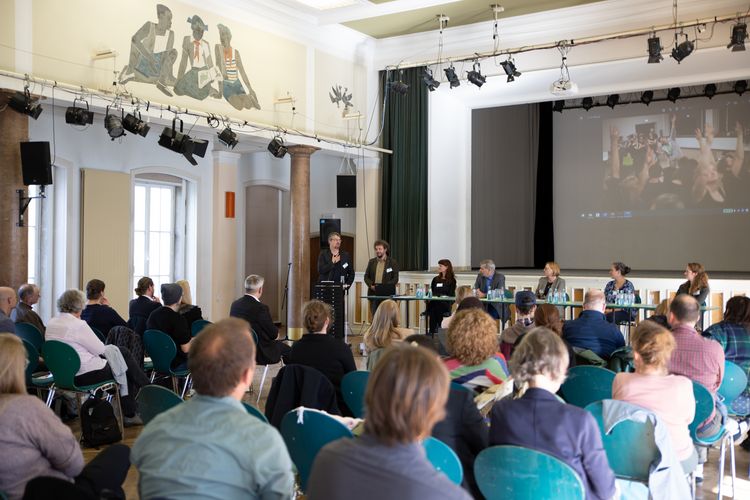Contrary to earlier assumptions, rural areas have their own development paths with breaks, interruptions, and alienations. The KUBILARI research project, divided into two sub-projects, investigates whether and how cultural arts education addresses the special transformation processes of rural areas, responds to developments, and represents the rural in a new way. The central question is how cultural arts education can make local or regional themes experiential and manageable with artistic-aesthetic methods and strengthen self-efficacy experiences.
The conference of the research project was divided into three thematic focuses. After a greeting from Sebastian Hecht from the Saxon State Ministry for Science, Culture and Tourism, there was an insight into empirical findings and analytical results from sub-projects I and II of the Cultural Arts Education and Rural Development project.
Empirical findings from the research project
The first subproject deals with the influence of cultural arts education on social changes and regional identities in rural societies. Professor Stephan Beetz and Ulf Jacob of the Mittweida University showed that there is a strong individuality of the studied regions and that they are difficult to compare with each other. Cultural arts education can contribute to the coping with change, but this has to be looked at in a more differentiated way than initially assumed by the research. The team developed four ideal types of transformation management. The type of processing and renewal actively deals with change and sees art as an experimental laboratory. As an alternative, there is the niche type, where people retreat into small solidarity communities. As a third type, the team developed the traditional type. Here, change is reacted to by returning to the familiar, such as craftsmanship. The last category is resilience, in which art is combined with concepts such as permaculture to create a regional survival model.
In the second subproject, Professors Steffen Kolb and Maren Irmer from HTW-Berlin focus on the media coverage of cultural arts education in Saxony. Their research shows that there is little coverage of cultural arts education in local print media. Over the past few years, coverage has shifted more towards service announcements. Sports news makes up the largest proportion of articles in local print media. The finding from the project shows that due to staff cuts and a strong user-oriented online-first strategy, editorial offices are no longer able to provide impulses for the regions.
Perspectives and experiences from practice
In the second focus of the conference, perspectives and experiences from the practice of the investigated regions Erzhammer, Neusalza-Spremberg and Hoyerswerda were shared. On the podium, Kristin Baden-Walther from the Erzhammer Cultural Center reported on the importance of local traditions such as carving and lace-making in cultural arts education work. Due to demographic change and the age structure of the population, offerings for seniors are also a key focus of the cultural center. Matthias Lehmann, as mayor of Neusalza-Spremberg, has made many decisive decisions in the field of cultural arts education. He has decided, for example, that cultural arts education in the region is funded from household budgets. In his view, cultural arts education is an effective means of combating emigration from rural areas. Dirk Lienig is a dancer and filmmaker. He realises intergenerational theater projects in Hoyerswerda, bringing together people who otherwise have few points of contact. The speakers agreed that scientific accompaniment leads to reflection on one's own practice and is therefore beneficial for the projects.
Challenges and potentials of cultural arts education in rural areas
Afterwards, the challenges and potentials of arts cultural education in rural areas were discussed. Andrea Gaede from the Landesverband Soziokultur Sachsen e.V. emphasized the functions of socioculture. On the one hand, people should be addressed where they move with their respective concerns. On the other hand, socioculture should enable encounters with each other. Professor Ulrich Klemm from the TU Chemnitz pointed out that cultural work must always be adapted to the regional conditions. "Missionising" from the outside is not very promising. Dr. Beate Kegler from the University of Hildesheim highlighted the tradition of cultural arts education in cultural centers in the eastern German states. Cultural arts education cannot be carried solely by volunteers. Professional mediators are significant. There is a lot of potential here to build on the traditional structures of cultural centers.
The event examined the topic of cultural arts education from different angles. Scientific results, experiences from practical cultural work and perspectives from the association levels were exchanged. It became clear that there is no patent recipe for cultural education. Cultural arts education is closely intertwined with regional structures. In order for it to work in rural areas, key people are needed to initiate new projects or maintain traditions.
